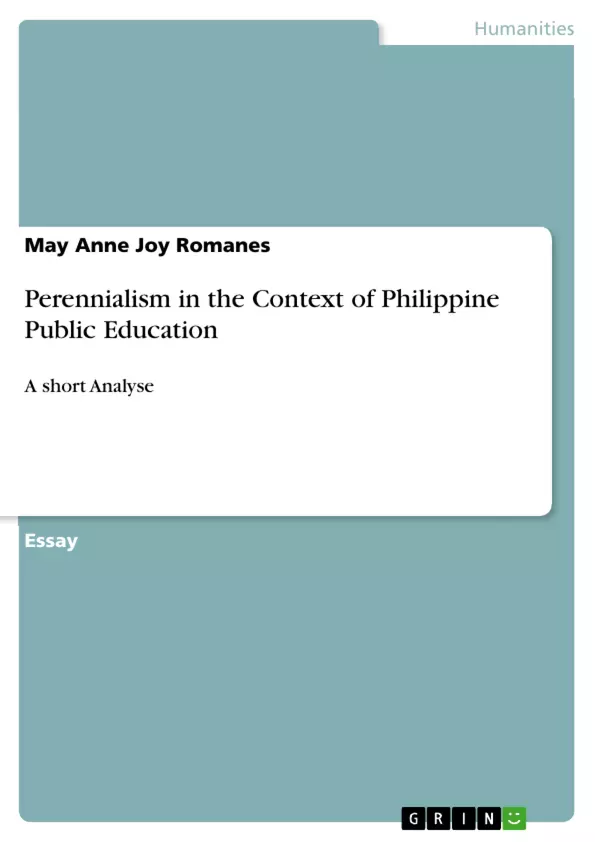This essay will discuss perennialism and its components, based primarily on the works of its major proponents, namely: Robert Maynard Hutchins and Mortimer Jerome Adler, its application to the Philippine context, and the author’s stand about the said philosophy. Perennial means everlasting, like a perennial flower that comes up year after year, which espouses the notion that some ideas have lasted over the centuries, and are as relevant today as when they were first conceived. These perennial ideas cannot just be disregarded because these also reflect what we, as a nation, have always wanted. It is interesting that these ideas, like democracy, truth, and good education, are what most of us sought ever since. However, in the modern era, educational systems have been more focus on change, and thereby indirectly rejecting the works that great people from the past have contemplated in their time; hence, it is very easy to find people who will oppose this educational philosophy. Given that most people are not open to this kind of philosophy at this time, as educators, who are seeking the best education for our students and ultimately for our nation, we need to examine and consider the philosophies, such as perennialism, and their ideals that could possibly attain our purpose.
Table of Contents
- Introduction
- Universal and Absolute Educational Principles
- Great Books of the Western World
- Liberal Education
- Analysis and Application of Perennialism in the Philippine Context
- Final Thoughts
- Points to Ponder
- References
Objectives and Key Themes
This essay explores perennialism, an educational philosophy that emphasizes the enduring nature of certain ideas and their relevance across time and cultures. It examines the core principles of perennialism, particularly as articulated by Robert Maynard Hutchins and Mortimer Jerome Adler, and applies them to the context of the Philippines. The essay also considers the author's perspective on perennialism and its implications for education in the modern era.
- The enduring nature of universal and absolute educational principles
- The role of great books in fostering critical thinking and reflective understanding
- The application of perennialist principles in the Philippine context
- The significance of moral and intellectual development in education
- The potential of perennialism to contribute to a more meaningful and fulfilling educational experience
Chapter Summaries
- Introduction: This chapter introduces the central question of whether there are universal and absolute principles of education, exploring the perennialist view that such principles are rooted in the goal of improving human beings. It highlights the need for educators to consider perennialism as a potential framework for achieving their objectives.
- Universal and Absolute Educational Principles: This chapter delves into the perennialist belief in universal and absolute educational principles that are not bound by time or place. It clarifies that the universality of these principles does not necessitate identical practices but rather encourages adaptation to different cultures and circumstances. The chapter presents three propositions supporting the idea of universal principles: the sameness of human nature, the purpose of education as improvement, and the twofold ends of education (proximate and ultimate).
- Great Books of the Western World: This chapter discusses the importance of "Great Books" in perennialist education. It emphasizes how these books serve as resources for teaching critical reading and reflective thinking about fundamental ideas and issues throughout history. The chapter highlights the potential of great books to reveal both truths and errors, promoting the search for truth as a central concept in perennialism.
Keywords
This essay focuses on perennialism as an educational philosophy, exploring its core principles, major proponents, and application to the Philippine context. Key terms include universal and absolute educational principles, great books, critical thinking, reflective understanding, moral and intellectual development, and the potential of perennialism to contribute to a more meaningful and fulfilling educational experience.
- Citar trabajo
- May Anne Joy Romanes (Autor), 2016, Perennialism in the Context of Philippine Public Education, Múnich, GRIN Verlag, https://www.grin.com/document/955945



